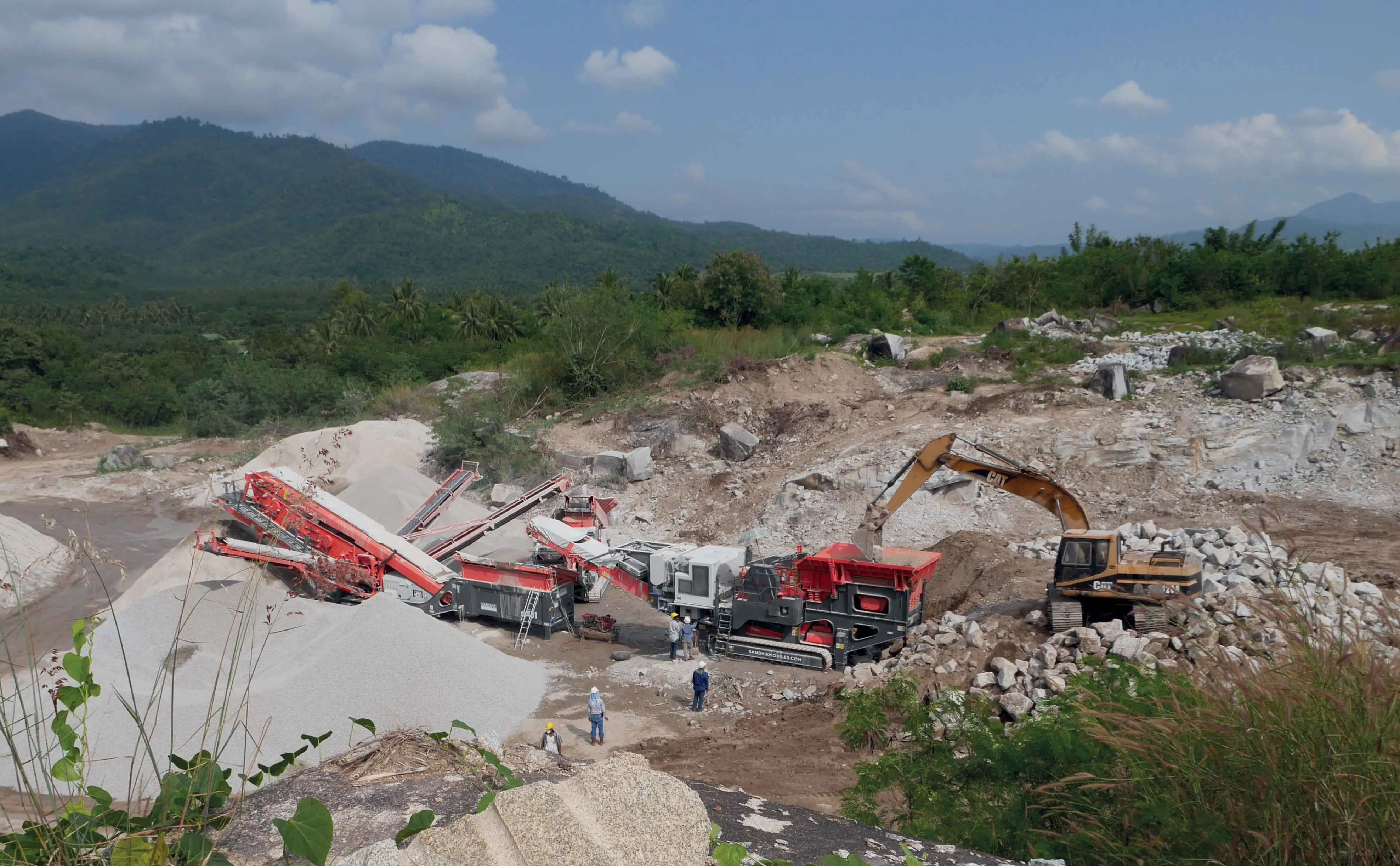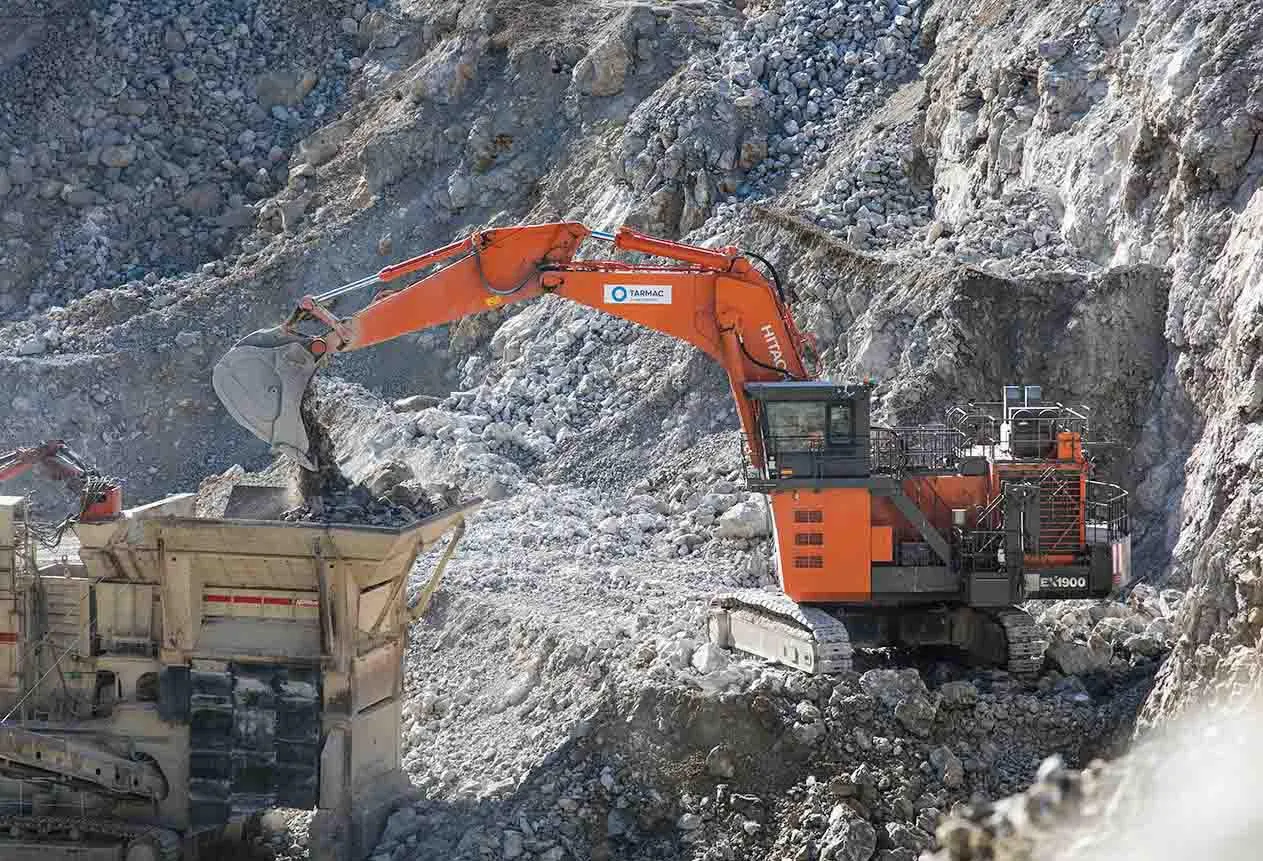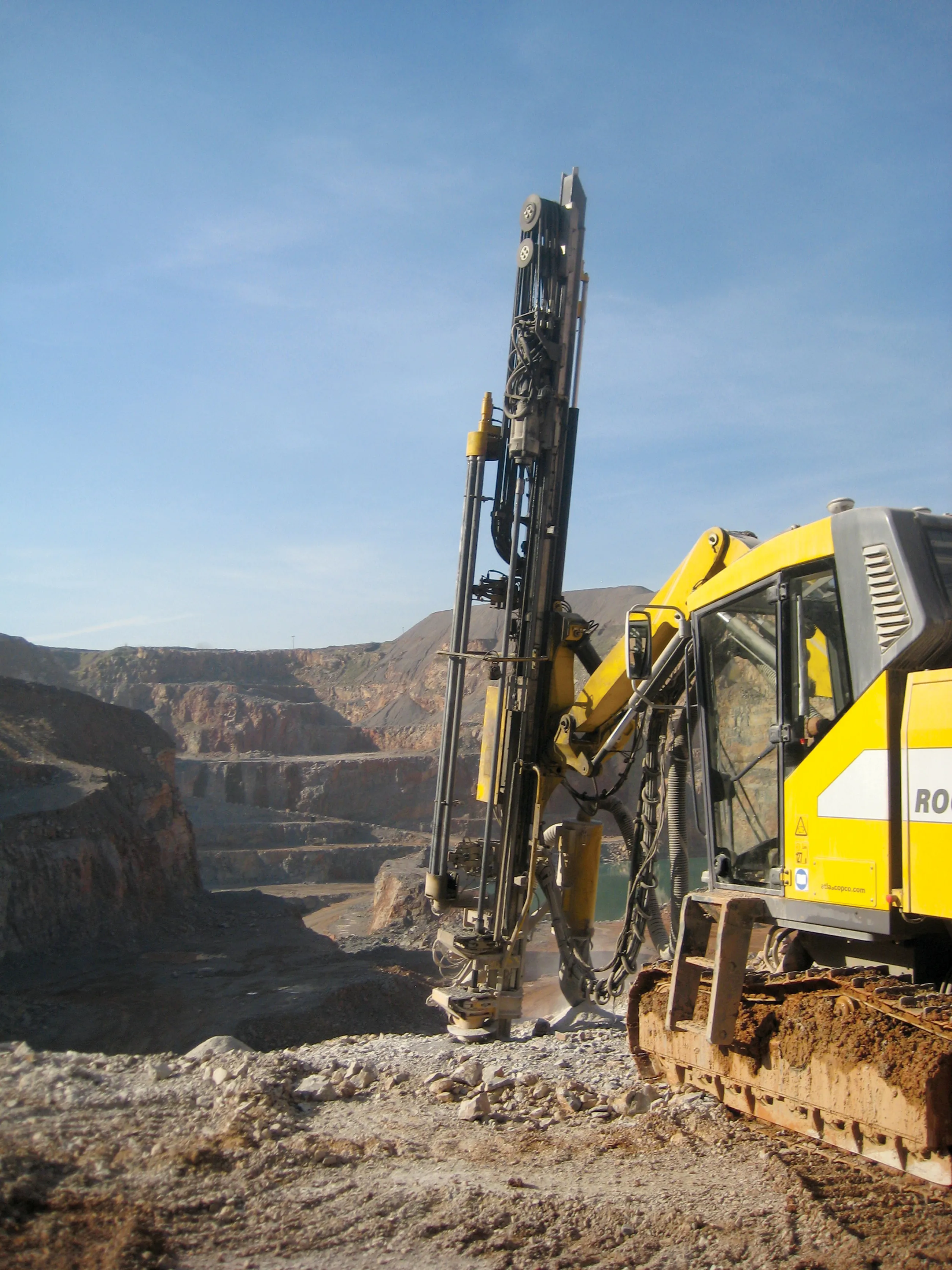The Prachuap Khiri Khan region of Thailand is well known for producing high quality aggregates, with four quarries and six concrete plants in operation. A key producer is Tabsakae Granite, which now operates a complete mobile crushing and screening plant. The Sandvik Construction QJ341 jaw crusher, QH331 Hydrocone crusher and a QA451 triple deck Doublescreen are now delivering high production of quality aggregates.
Tabsakae Granite operates a quarry and a concrete plant in the Prachuap Khiri Khan region
June 6, 2016
Read time: 6 mins

The Prachuap Khiri Khan region of Thailand is well known for producing high quality aggregates, with four quarries and six concrete plants in operation
A key producer is Tabsakae Granite, which now operates a complete mobile crushing and screening plant. The2403 Sandvik Construction QJ341 jaw crusher, QH331 Hydrocone crusher and a QA451 triple deck Doublescreen are now delivering high production of quality aggregates.
Tabsakae Granite operates a quarry and a concrete plant in the Prachuap Khiri Khan region of Thailand. The quarry aims to produce 50,000tonnes of aggregate/month, with around 40 trucks transporting the product away every day. The company has permission to operate at the 208,000m2 location for 10 years. Some 60% of the aggregate production is sold to other companies, with the remaining 40% being used by the company’s own concrete plant. This is situated approximately 40km to the south of Prachuap Khiri Khan, and 40km away from the quarry, delivering concrete within a 100km radius. Another production line produces granite aggregate for use in dam protection in several regions of Thailand.
The aggregate is supplied to Bangladesh, Brunei and Singapore and throughout Thailand, with one interesting application being the planned lower east-west railway corridor which is financed in cooperation with Japan. The railway line connects the planned Dawei Project in Myanmar (a deep sea port which is built to open up a new transport link between South East Asia and southern China) with ports in Vietnam and with China.
With such a wide variety of customers, from an extensive geographic spread, the firm had difficult decisions to make. It needed a modern crushing and screening plant that was versatile, productive, and able to produce the accurately sized aggregates its customers require. In order to do this the firm discussed its requirements with Noppadon Singju from PV Mining & Exploration. The PV Group, with its head office in Bangkok is the Thai dealer for Sandvik Construction, as well as a specialist in mineral excavation planning applications, and obtaining permits for the use of explosives. The two companies worked closely to design a process of how to best produce products from the granite quarry, and then transport it for aggregate production.
The first stage of granite production at the quarry is currently accomplished by hydraulic breakers and excavators. However, this is only an interim solution, as PV Mining is undertaking the necessary legal and associated work for Tabsakae Granite to acquire a license to use explosives at the site. When permission is obtained to use explosives drill and blast will be used.
The decision to acquire a stationary or a mobile crushing plant was never seriously questioned. It was never planned to get permission for a fixed plant in Prachuap Khiri Khan. From the beginning the firm wanted to use a mobile crusher plant. Once the choice to use a mobile solution was made the company had interesting discussions with PV Mining as to which crushers to choose. The decision was quickly made, as it was very clear to Isun that Sandvik mobile crushers and screens were the best choice. In order to choose the right equipment mix, Isun had to first establish the production he required, and what sizes. Noppadon made a variety of proposals before settling on a crushing plant to suit the specific requirements.
The plant enables the firm to change the production site within a very short time. Furthermore the plant has lowered the cost/tonne of aggregate which is boosting the profitability of the quarry. Sandvik and PV Explosives have also been able to provide support due to their extensive knowledge of the whole quarrying process, and through this were able to deliver the right mix of equipment, service and support.
In effect the best crushing and screening system had been decided upon, which optimises the complete quarry operation, with the best balance between throughput, efficiency and setup. Sandvik also provided support and advice, bringing different parts of the production process together. In addition to the equipment, professional training and advanced simulation programmes were used, drawing on data from numerous job sites from all over the world.
The crushers and screens are used processing ballast from 63-25mm, and concrete aggregates in fractions of 25-10mm, and 10-0mm. Cost-effective production is ensured with the combined plant having low fuel consumption of around 100litres/hour. The plant currently works in closed circuit, in a star formation designed to maximise production efficiency.
A mobile jaw crusher is at the start of the plant, with the QJ341 used at the quarry designed to operate in a variety of different conditions. Equipped with a single toggle jaw crusher, this heavy-duty machine delivers high output. Designed to be able to work in rugged conditions, the QJ341 weighs 48.2tonnes and has an impressive 1200 x 750 mm wide jaw opening. This enables high output at high reduction ratios, with the modern intelligent design meaning tricky applications are easily dealt with.
Operator control and use is inbuilt into the QJ341, with the Sandvik PLC control system and control screen making the crusher easily controllable. The automated control system, wide maintenance platforms and the dust-proofed component are also designed for operator convenience and safety, being highly appreciated by the 15 staff at the quarry. The 261kW Cat diesel offers low fuel consumption. To maximise output the jaw setting is hydraulically adjustable, and may be reversed in order to relieve blockages. Crusher downtime is minimal and it can be started under load with the hydraulic drive.
The QH331 cone crusher features the proven CH430 cone. This is equipped with a hydroset system which facilitates several adjustment functions. The automatic setting regulation system optimises production, as well as minimising interruptions and downtime by controlling the liner wear. A level sensor is also fitted for regulating the feed, optimising production, reduction and shape.
Another feature on the QH331 is the remote camera. This enables viewing of the crushing chamber from ground level for ease of operation and operator safety. The 261kW engine of the 32.8tonne QH331 delivers high power and low fuel consumption by using the efficient direct drive system.
The final unit of the crushing and screening system is the QA451 Doublescreen, which features Sandvik’s patented Doublescreen technology. This system enables an increase in throughput, control and screening efficiency due to the two inline independent screenboxes.
The QA451 has two screenboxes, each 3 x 1.5m, a large hopper and extended conveyor belts. When used in conjunction with the tracked crushers, the QA451, as well as other Sandvik mobile screeners, is able to work in closed circuit operation. If in future an extension to the plant is needed, a fourth unit may be easily added. Facilitating enhanced production, the feeding position to this fourth upstream unit can be optimised by slewing, raising or lowering the fourth conveyor hydraulically.
By mid-2016 at the latest, plans are in place to move the whole mobile crushing and screening plant from the current site to another location. With the decision made to operate a mobile plant, Tabsakae Granite now possesses a versatile solution which can easily accomplish this.
A key producer is Tabsakae Granite, which now operates a complete mobile crushing and screening plant. The
Tabsakae Granite operates a quarry and a concrete plant in the Prachuap Khiri Khan region of Thailand. The quarry aims to produce 50,000tonnes of aggregate/month, with around 40 trucks transporting the product away every day. The company has permission to operate at the 208,000m2 location for 10 years. Some 60% of the aggregate production is sold to other companies, with the remaining 40% being used by the company’s own concrete plant. This is situated approximately 40km to the south of Prachuap Khiri Khan, and 40km away from the quarry, delivering concrete within a 100km radius. Another production line produces granite aggregate for use in dam protection in several regions of Thailand.
The aggregate is supplied to Bangladesh, Brunei and Singapore and throughout Thailand, with one interesting application being the planned lower east-west railway corridor which is financed in cooperation with Japan. The railway line connects the planned Dawei Project in Myanmar (a deep sea port which is built to open up a new transport link between South East Asia and southern China) with ports in Vietnam and with China.
With such a wide variety of customers, from an extensive geographic spread, the firm had difficult decisions to make. It needed a modern crushing and screening plant that was versatile, productive, and able to produce the accurately sized aggregates its customers require. In order to do this the firm discussed its requirements with Noppadon Singju from PV Mining & Exploration. The PV Group, with its head office in Bangkok is the Thai dealer for Sandvik Construction, as well as a specialist in mineral excavation planning applications, and obtaining permits for the use of explosives. The two companies worked closely to design a process of how to best produce products from the granite quarry, and then transport it for aggregate production.
The first stage of granite production at the quarry is currently accomplished by hydraulic breakers and excavators. However, this is only an interim solution, as PV Mining is undertaking the necessary legal and associated work for Tabsakae Granite to acquire a license to use explosives at the site. When permission is obtained to use explosives drill and blast will be used.
The decision to acquire a stationary or a mobile crushing plant was never seriously questioned. It was never planned to get permission for a fixed plant in Prachuap Khiri Khan. From the beginning the firm wanted to use a mobile crusher plant. Once the choice to use a mobile solution was made the company had interesting discussions with PV Mining as to which crushers to choose. The decision was quickly made, as it was very clear to Isun that Sandvik mobile crushers and screens were the best choice. In order to choose the right equipment mix, Isun had to first establish the production he required, and what sizes. Noppadon made a variety of proposals before settling on a crushing plant to suit the specific requirements.
The plant enables the firm to change the production site within a very short time. Furthermore the plant has lowered the cost/tonne of aggregate which is boosting the profitability of the quarry. Sandvik and PV Explosives have also been able to provide support due to their extensive knowledge of the whole quarrying process, and through this were able to deliver the right mix of equipment, service and support.
In effect the best crushing and screening system had been decided upon, which optimises the complete quarry operation, with the best balance between throughput, efficiency and setup. Sandvik also provided support and advice, bringing different parts of the production process together. In addition to the equipment, professional training and advanced simulation programmes were used, drawing on data from numerous job sites from all over the world.
The crushers and screens are used processing ballast from 63-25mm, and concrete aggregates in fractions of 25-10mm, and 10-0mm. Cost-effective production is ensured with the combined plant having low fuel consumption of around 100litres/hour. The plant currently works in closed circuit, in a star formation designed to maximise production efficiency.
A mobile jaw crusher is at the start of the plant, with the QJ341 used at the quarry designed to operate in a variety of different conditions. Equipped with a single toggle jaw crusher, this heavy-duty machine delivers high output. Designed to be able to work in rugged conditions, the QJ341 weighs 48.2tonnes and has an impressive 1200 x 750 mm wide jaw opening. This enables high output at high reduction ratios, with the modern intelligent design meaning tricky applications are easily dealt with.
Operator control and use is inbuilt into the QJ341, with the Sandvik PLC control system and control screen making the crusher easily controllable. The automated control system, wide maintenance platforms and the dust-proofed component are also designed for operator convenience and safety, being highly appreciated by the 15 staff at the quarry. The 261kW Cat diesel offers low fuel consumption. To maximise output the jaw setting is hydraulically adjustable, and may be reversed in order to relieve blockages. Crusher downtime is minimal and it can be started under load with the hydraulic drive.
The QH331 cone crusher features the proven CH430 cone. This is equipped with a hydroset system which facilitates several adjustment functions. The automatic setting regulation system optimises production, as well as minimising interruptions and downtime by controlling the liner wear. A level sensor is also fitted for regulating the feed, optimising production, reduction and shape.
Another feature on the QH331 is the remote camera. This enables viewing of the crushing chamber from ground level for ease of operation and operator safety. The 261kW engine of the 32.8tonne QH331 delivers high power and low fuel consumption by using the efficient direct drive system.
The final unit of the crushing and screening system is the QA451 Doublescreen, which features Sandvik’s patented Doublescreen technology. This system enables an increase in throughput, control and screening efficiency due to the two inline independent screenboxes.
The QA451 has two screenboxes, each 3 x 1.5m, a large hopper and extended conveyor belts. When used in conjunction with the tracked crushers, the QA451, as well as other Sandvik mobile screeners, is able to work in closed circuit operation. If in future an extension to the plant is needed, a fourth unit may be easily added. Facilitating enhanced production, the feeding position to this fourth upstream unit can be optimised by slewing, raising or lowering the fourth conveyor hydraulically.
By mid-2016 at the latest, plans are in place to move the whole mobile crushing and screening plant from the current site to another location. With the decision made to operate a mobile plant, Tabsakae Granite now possesses a versatile solution which can easily accomplish this.









